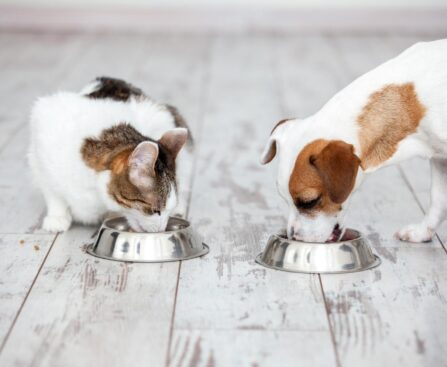When purchasing pet food, you need to make sure that you are giving your animals a quality diet. There are a variety of descriptors for pet food, some of which have legal definitions and some that don’t, and it is essential to choose the right one for your pet. Here are some of the key […]
When purchasing pet food, you need to make sure that you are giving your animals a quality diet. There are a variety of descriptors for pet food, some of which have legal definitions and some that don’t, and it is essential to choose the right one for your pet. Here are some of the key ingredients to look for in high quality pet foods.
Ingredients in high quality pet food
When choosing a high-quality pet food, look for foods that contain a balanced blend of vitamins, minerals, and fats. Dogs and cats have differing nutritional needs. For instance, cats are obligate carnivores, whereas dogs are omnivores and can survive on a plant-based diet. Meat is the primary ingredient in a cat food, but organ meats are also very nutritious and should be included in your pet’s diet. Fresh meat is also the best option, because it is the most digestible source of vitamins, minerals, and amino acids. Some formulas, however, contain dehydrated protein as a substitute for fresh meat.
In addition to meat, other ingredients that make a high-quality pet food are rich in essential fatty acids and antioxidants. Some of these ingredients may be natural, while others contain chemicals and preservatives. The most important ingredient in pet food is meat, as it provides your pets with protein and fat, which are essential for your pets’ health. Chicken, beef, lamb, and other meat are all great sources of protein and fat.
When choosing high-quality pet food for your pet, you should avoid food that contains MSG. MSG is a common flavour enhancer that can be harmful to both humans and pets. It is used to compensate for the lack of flavour in low-quality ingredients, but it is also an allergen.
Avoiding grains in pet food
Grain-free pet food is an increasingly popular option. More pet food brands are adding grain-free options in response to consumer demand. The New York Times traces this movement to the 2007 Chinese kibble recall, when wheat gluten was found to be contaminated with melamine. This recall sparked a growing concern about the dangers of grains and wheat.
Grain-free pet food can be beneficial to your pets’ health. The high-fiber content can improve their digestive systems. They contain plenty of vitamins and minerals. They also add extra protein, and they can even improve your dog’s coat and skin. However, you must make sure the grain you are feeding is properly formulated to meet your pet’s nutritional needs.
Grain-free pet food has also been linked to heart problems in some animals. A recent study by the FDA found a correlation between grain-free diets and atypical DCM in pets. In addition, the FDA found that a higher percentage of pets fed grain-free diets had heart problems.
Some dog food advocates may ostracize you if you feed your dogs grains. But the truth is, every dog is an individual. And while there is no single diet that is best for your dog, it is important to select a high-quality, grain-free dog food that includes a balanced nutrition.
Avoiding artificial preservatives
It’s not always easy to avoid artificial preservatives in pet food, but there are ways to make sure you don’t give your pet preservative-filled food. One simple way is to check the labels on the food. Many pet food manufacturers are not forthcoming about artificial additives, which means you have to look for foods clearly labeled as artificial preservative-free or contact the manufacturer.
Natural preservatives are much less likely to cause side effects, and they may even benefit your dog’s health. However, natural preservatives are not free from risks, and some are not good for your pet. Sugar and salt are two examples of natural preservatives that aren’t good for dogs. Despite their negative effects, many companies still use these ingredients as preservatives because they’re much cheaper than artificial alternatives.
Many pet food manufacturers use artificial preservatives to prolong the shelf-life of their products. These chemicals slow the breakdown of food and increase its shelf life, but they aren’t good for your pet. You can also find foods without artificial preservatives if you’re willing to do some research. You’ll be surprised by the choices available to you.
Some companies claim to be “ethoxyquin-free” on their labels. You can also ask the company’s representatives directly, but you may have to take their word. Regardless, it’s best to avoid artificial preservatives in your dog’s food just to be safe.

